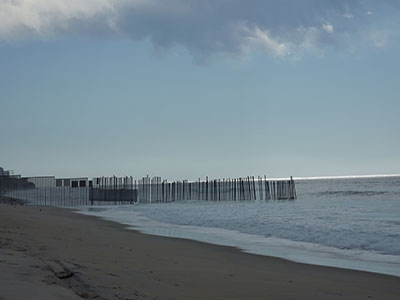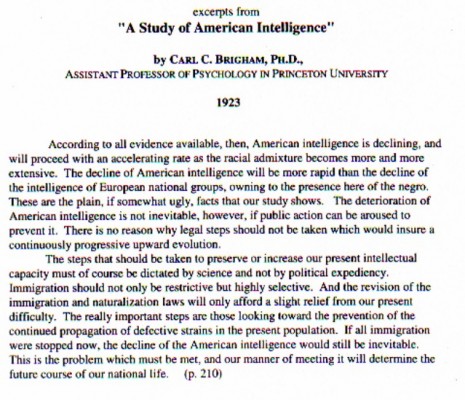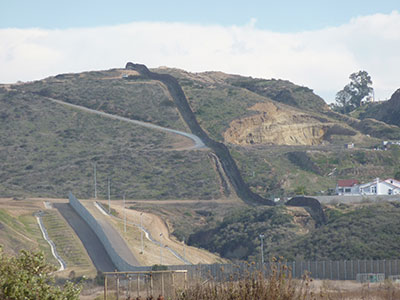In this five-part series, Greg Olear talks with Katie Arnoldi about how U.S. policies on marijuana and immigration are detrimental to our nation’s health. Click here to read from the beginning.
[Greg Olear]: Ever since the second ship after the Mayflower landed, there has been conflict in this country between the “natives” and the “immigrants.” The notorious Know-Nothing Party began life in the 1850s on an anti-immigrant/anti-Catholic (they were more or less the same thing) platform. Later nativist parties with gung-ho patriotic names like the Order of the United Americans and the Order of the Star-Spangled Banner lobbied for stricter immigration laws, especially with respect to the “Chinamen,” on whose underpaid backs the railroads were built.
This conflict was especially strong during the great immigration waves of 1880-1920, when xenophobic “natives” spent their free time formulating theories on eugenics (popularized to justify slavery on “scientific” grounds) and convinced themselves that the latest arrivals to the country—the Italians and especially the Poles—were genetically inferior to Anglo-Saxons. The 1923 publication of C. C. Brigham’s A Study of American Intelligence by the vaunted Princeton University Press seemed to confirm these odious theories, giving Ivy League weight to the nativist cause. The draconian Immigration Act of 1924 created a quota for new immigrants based on how many people from a given country were already U.S. citizens. Among the groups most impacted by this shameful piece of legislation were Eastern European Jews, who were denied mass entry to the United States even when being rounded up in Nazi concentration camps a decade and a half later. (In addition to being indirectly responsible for the death of many Russian and Polish Jews, Brigham went on to create the SATs; if there is a hell, he’s its psychologist in residence).
In short, there have always been problems with our immigration policy: it’s too restrictive, it’s not restrictive enough, the borders are too porous, the borders aren’t porous enough. And some band of “real” Americans, themselves descended from immigrants, want to defend their jobs from the onslaught of Irish and Italians and Puerto Ricans and now Mexicans and Hondurans and El Salvadorans ready and willing to come here with their foreign (and therefore “inferior”) language, culture, and customs, and work more hours for less money. Once it was the aforementioned Order of the Star-Spangled Banner opposing the influx of Irish Catholics in New York; today, it’s the Tea Party opposing the influx of Mexicans and other Latin Americans in Texas and New Mexico and Arizona. But it’s the same people. And these people patrol the border as self-appointed vigilantes. Why are they there? What motivates them? Don’t they have anything better to do with their spare time?
[Katie Arnoldi]: I wonder if that “pull up the draw-bridge” mentality is an instinctual part of human nature, some relic from the days when we were foraging for our food and defending our territory as a means of survival. I don’t know. But it’s amazing how this same pattern continues to repeat itself, over and over again, throughout history and all over the world.
The Minutemen Project and the splinter organizations Minutemen Civil Defense Corps (MCDC) and Minutemen American Defense (MAD) are the best-known vigilante groups operating on the U.S./Mexico border, but there are many others. They have mission statements like “Bringing National Awareness to the Illegal Alien Invasion.” These groups are composed of like-minded citizens who have decided to take the law into their own hands by patrolling the border in an attempt to corner and capture people who are trying to enter the country illegally. Racism certainly plays a large role. Typically these groups are armed, and I think they’re insanely dangerous. Our government does not support or condone their activities, but they’re hard to stop. In 2010, MCDC chairman Carmen Mercer sent an email to members encouraging them to arrive at the border “…locked, loaded and ready to stop each and every individual we encounter along the frontier…” Your basic Minutemen Jihad. There was such uproar over the implication of her message that the organization decided (or was forced?) to disband. But as I said, there are plenty of other groups filling the MCDC void.
[GO]: I have a vague memory of John McCain getting in hot water by associating himself with that group in 2004, and then backtracking.
[KA]: I have to stop here and talk about the reality of life on the Arizona, Texas, and even California border for the ranchers and farmers who live in the more isolated areas. The crime rate has exploded in the last ten years. The cartels are moving huge amounts of drugs and people across private land, every single day of the year. The American ranchers and farmers who live in remote border areas are absolutely under siege. Break-ins, robberies, violent assault, murder, it is seriously dangerous to live and work on the border. Last year I visited some ranchers in West Texas. I don’t know how many thousands of acres they owned but the nearest neighbor was over fifteen miles away and the town a good hour’s drive. When I came into their house I noticed a semi-automatic weapon sitting by the front door. When I walked into the kitchen, there was a shotgun by the window. They had guns in every room of the house. There were alarms and sensors buried all around the property; no one went outside without a firearm. They told me that there was a steady stream of people sneaking across their land and that they had attempted break-ins on a regular basis. Dialing 911 is useless when law enforcement is over an hour away. These people, living in such isolation, have to protect themselves; they have no other option. So when I bring my ultra-liberal sensibility down to West Texas and start lecturing about absolute gun control and border issues, I have to realize that there are many parts to this problem and certainly no easy answers.
[GO]: Everything is connected, for sure. But the violence and spike in crime correlates to the tighter border restrictions and the enlarged involvement of the cartels in human trafficking. There are better ways to do this without citizens having to organize their own militias. Also, I think it’s important to note that these ranchers are NOT to be confused with the Minutemen; there’s a difference between protecting yourself and being a vigilante.
[KA]: The people I spoke to in West Texas have tremendous respect for the Mexican people. Generations of ranchers have worked both sides of the border, and up until 1994 there was a symbiotic ebb and flow of immigration that benefited everyone. Today their concerns about border policy are based in the day-to-day practicalities of keeping their families safe. It is the organized criminal activity of the cartels that are posing the threat—not the immigrants themselves.
[GO]: What makes all of this particularly vexing is that our economy depends on this influx of cheap labor. I don’t think people realize what a blow it would be if these undocumented workers stopped coming. Do you have an estimate for how big this workforce is?
[KA]: We employ between 3 and 4 million farm workers annually to pick and harvest our food. According to the National Agricultural Workers Survey (NAWS), which is performed under contract to the U.S. Department of Labor, approximately fifty percent of farm workers do not have legal status to work in the U.S.
[GO]: Half! That’s half the workforce!
[KA]: I think that number is low, but I’ll be conservative in my analysis. So each year we’re looking at 1.5 million undocumented farm hands. In 2010 the U.S. Department of State only issued 55,921 H2A visas, which are for temporary agricultural guest workers. That’s a discrepancy of 1,444,079 people. These are government figures. It’s insane that the agricultural industry is allowed to get away with this kind of exploitation.
[GO]: Sickening is another word that comes to mind. You know, labor unions tend to take a lot of flak in the media—look at what happened in Wisconsin with the collective bargaining, and how state and federal governments continue to bleed the teachers’ unions—but without the protection of labor unions, workers are literally wage slaves. Just because unions seem obsolete now doesn’t mean working conditions wouldn’t immediately get worse if their power eroded.
[KA]: I want to point out here that the men and women working in the fields are earning about ten times what they could back home in Mexico.
[GO]: True. But immigrant workers are a long way from enjoying union protection. What are some steps we can do now that would help this problem?
[KA]: We need to instigate a viable guest worker program with Mexico. We need to crack down on the agricultural industry, and stop them from hiring undocumented labor. The same is true with hotels, restaurants, and construction companies. Of course these industries don’t want to change their hiring practices because documented employees are entitled to things like worker’s compensation, housing, transportation, disability. A viable guest worker program will increase costs and decrease profit.
If we offer a viable, legal way for people to come and work, and then return to their country at the end of the growing season, we will practically eliminate illegal immigration. If we start enforcing the labor laws which are already in existence, people will stop sneaking across our border because there won’t be any jobs for them. Let’s see some FAIR TRADE of not only goods but also labor. We know that we need the Mexican workforce; it’s time to overhaul our visa policies.
[GO]: You hinted at this before, too, so let me ask explicitly: you’re saying that most of these immigrants aren’t interested in staying here, just in earning more money to support their families back home. Is that true? Because it contradicts what many “nativists” think.
[KA]: Look, we live in the greatest country in the world. I truly believe that. So of course there will always be people from other countries who want to move here and start a new life. But I’m talking about illegal immigration. People cross illegally from Mexico into the U.S. because there are better opportunities on this side of the border. They know that they will be hired if they can just get here. NAFTA wiped out the peasant farmer when we exported our agricultural products—products that were probably grown by Mexican nationals—and flooded their market with our subsidized goods. NAFTA also allowed companies like Wal-Mart to invade Mexico and bankrupt many small and mid-sized business all across the country. We have exploited our neighbor in so many ways, worsened conditions for the lower and middle class families, and then we’re surprised when people start flooding across the border, searching for a way to feed their families and improve their quality of life? At this point I think people are coming here with the idea of staying because there aren’t any opportunities at home. What I’m saying is that if the jobs are only given to documented workers, then the incentive to come here will be greatly reduced. If there is no work, there’s no reason to come.
[GO]: I didn’t realize Wal-Mart was prominently involved with this (although I’m not surprised). Did it just do what they did here in Mexico, but on a grader scale?
[KA]: Wal-Mart is the largest employer in Mexico. And yes, they’ve done the exactly same thing that they did here, wiped out small and mid-sized companies all over the country only on an even bigger scale. It’s impossible for small businesses to compete against Wal-Mart de Mexico.
Next week: we discuss how the policies affect women.






